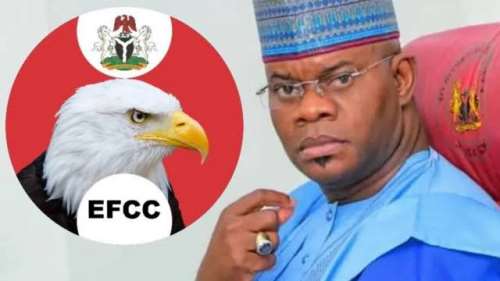*As Governor Suspends Attorney General For Challenging EFCC’s Legality
The Economic and Financial Crimes Commission (EFCC) has sought for adjournment of hearing in its fresh charge against the immediate-past Governor of Kogi State, Yahaya Bello and two others, to November 14, 2024.
Benue Governor Suspends Attorney General For Challenging EFCC’s Legality
This is even as the governor of Benue, Hyacinth Alia has suspended the state’s Attorney General and Commissioner of Justice and Public Order, Fidelis Mnyim.
The justice commissioner was suspended for joining states challenging the establishment of the Economic and Financial Crimes Commission (EFCC) and the Independent Corrupt Practices and Other Related Offences Commission (ICPC).
However,at the resumed hearing, Counsel to the Commission, Rotimi Oyedepo, said the court issued public summons against Bello, directing that same be published and that the charge be pasted.
The trial Judge, Justice Maryann Anenih, however, interjected, stating that she did not ask that the charge be pasted, only the summons.
Oyedepo said he expected Bello to be in court on November 14, making reference to the 30-day duration of the summons, and therefore sought for adjournment till November 14 for arraignment of the three defendants.
Joseph Daudu and senior advocate of Nigeria, who appeared for the 2nd defendant, however, objected to this.
He stated that the matter was for arraignment, and that they were ready, noting that the defendants were all independent and should be treated as such.
“You cannot be using somebody as a human shield when they are not in hostage. I don’t like this practice,” he said.
Counsel to the 3rd defendant, aligned with Daudu, he stated in the alternative that the court take his client’s application for bail.
The EFCC Counsel, Oyedepo, however, said that the application for bail could not be taken as the charge was a joint charge.
According to him, there are counts of conspiracy in it.
Insisting that the court should adjourn to November 14, the EFCC lawyer notified the court that there was an application for the enforcement of fundamental rights of the 2nd defendant and that the oral application cannot be taken.
The 2nd defendant’s counsel, Daudu, however, insisted that this negated the principles of fair hearing.
“His argument is persuasive but does not go by what the law says. That until one individual appears before they can be arraigned. I don’t understand this kind of practice.
“It is an affront to fair hearing because the privilege of fair hearing allows us to raise any issue. Keeping them for 10 years will have no impact.
“They have enjoyed administrative bail before with the EFCC, so it won’t hurt their pride if they give them,” he stated.
The 2nd defendant’s counsel also asked for a date for fundamental rights application for his client.
Though the trial judge refused the oral application for bail, she said the defendants should come formally by filling applications in writing.
Justice MaryAnne Anenih, subsequently adjourned to 14th and 20th November for response of the 1st defendant to summons and/or arraignment.
ALSO READ:Tinubu Reshuffles Cabinet, Enoh, Uzoka-Anite, Alausa, Seven Others Get New Ministries
Benue Governor Alia Suspends AG For Challenging EFCC’s Legality
Governor Hyacinth Alia of Benue suspended the state’s Attorney General and Commissioner of Justice and Public Order, Fidelis Mnyim for joining states challenging the establishment of EFCC and ICPC.
On Tuesday, the Supreme Court reserved judgment in a suit filed by 19 states challenging the constitutionality of the laws establishing the EFCC.
While two states – Imo and Bauchi – joined the suit as co-plaintiffs, Osun State sought a consolidation of the suit, while three states – Anambra, Ebonyi and Adamawa – withdrew their suits.
The 19 states still in the suit are Kogi, Kebbi, Katsina, Sokoto, Jigawa, Enugu, Oyo, Benue, Plateau, Cross River, Ondo, Niger, Edo, Bauchi, Imo, Osun, Nasarawa, Ogun, and Taraba.
The states argued that it was the UN Convention against corruption that was reduced into the EFCC Establishment Act and that in enacting this law in 2004, the provision of Section 12 of the Nigerian constitution was not followed.
They argued that in bringing a convention into the Nigerian law, the provision of Section 12 must be complied with.
The court is to communicate a date for judgment to all parties.
